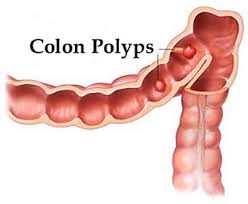What is colon polyp?
A benign growth of the lining of the colon is called colon polyp. These are formed by the abnormal cells on the end of a stalk of normal cells. It grows from 2mm up to 5cm or more in diameter. Colon polyps can be raised or flat. There can be one or more than one polyp. Some colon polyps are benign while others may already be cancers or have a tendency to become cancer. Flat polyps are more likely to become cancer as compared to raised polyps.
Who is more prone to colon polyp?
Male have higher incidences of development of colon polyp as compared to females. Risk of colon polyp increases with increasing age, usually after 40 years of age.
What are the causing factors of colon polyp?
When a mutation in gene occurs, it can cause cells to continue dividing when there is no need for new cells. This unregulated growth is the cause of the formation of polyps. In long-standing cases, some of these polyps may become malignant.
Risk factors:
-Age above 50 years.
-A family history of polyps.
-A family history of cancer of large intestine.
-History of uterine or ovarian cancer before 50 years of age.
-Eating fatty food.
-Smoking and drinking alcohol.
-Obesity.
Colon polyp signs and symptoms?
-Rectal bleeding
-Blood in stool
-Constipation or diarrhea
-Pain or obstruction in the abdomen due to large colon polyp which may partially obstruct bowel resulting in abdominal cramps, nausea, vomiting, and severe constipation.
How often do you need a colonoscopy if you have polyps?
If the person is having colon polyp than colonoscopy should be done in 3 to 5 years.
How long does it take for a polyp to become cancerous?
It takes about 10 years for a small precancerous polyp to grow into cancer. Therefore, if an appropriate colorectal cancer screening is performed, these polyps can be removed before they turn into cancer.
Can a polyp go away on its own?
Small polyps can go away of their own but if they remain untreated, there may be chances of becoming cancerous.
How do you prevent polyps in the colon?
-Eat more fruits, vegetables.
-do physical exercise to maintain body weight if a person is obese.
How to investigate colon polyp?
-Computerized tomographic colonography (CTC)
-Flexible sigmoidoscopy.
-Colonoscopy.
-Fecal blood tests.
-Stool DNA testing.
-Genetic testing. If you have a family history of colorectal cancer, this blood test may help determine if you’re at increased risk of colon or rectal cancer.
Diet/management of colon polyp?
-Calcium-rich diet
-takes plenty of fruits, vegetables and whole grains in the diet.
-limit fat intake
-Limit alcohol consumption.
-Avoid tobacco as it increases the risk of colon cancer.
-do exercise regularly.
-If there is a family history then regular screening is necessary.
Homeopathic treatment for colon polyp?
Homeopathy treats symptomatically as a permanent treatment for colon polyp is not possible with homeopathy.
Medicines include:
-Hydrastis Canadensis
-Ornithoglum umbellatum
-Cobaltum metallicum


 If you are unsatisfied with our treatment and do not want to continue the medicines you can ask for refund within 24 hours of making the payment.
If you are unsatisfied with our treatment and do not want to continue the medicines you can ask for refund within 24 hours of making the payment.